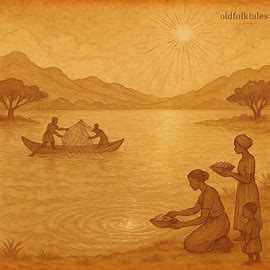Long ago, before Burundi became the land of villages, fields, and bustling markets, the world was shaken by a great flood. The gods, angered by the corruption and sin of humankind, unleashed waters that covered valleys and plains, swallowing homes, forests, and rivers alike. The people cried out, but the gods remained silent, their purpose clear: to cleanse the earth of its wrongdoings and begin anew. When the rains finally ceased and the waters receded, they did not vanish completely. Instead, they gathered together into a vast, shimmering expanse, Lake Tanganyika, one of the largest and deepest freshwater lakes the world has ever known.
From its earliest days, the lake was more than a body of water; it was a living force. Its surface glistened like polished glass under the sun, yet its depths were cloaked in mystery, hiding the spirits said to dwell below. The people of Burundi soon learned that the lake held both generosity and danger. To some, it was a source of life, offering fish, water, and fertile soils along its shores. To others, it was a realm to be feared, for the spirits of the lake could grant fortune or misfortune depending on how they were treated.
The Birth of a Sacred Lake
The tale tells that when the gods allowed the floodwaters to settle, they placed their power within the lake to remind humanity of both punishment and mercy. The people who returned to rebuild their homes along the shores marveled at its size. They had never seen water stretch so far that one could sail for days without reaching the opposite bank. Fishermen who dared to cast their nets in its depths often came back with more than fish, they carried stories of strange voices rising from the water, of shimmering figures glimpsed beneath the waves, and of sudden storms that seemed to appear at the command of unseen hands.
READ THIS: The Legend of Bantu Origins: A Burundian Folktale
The lake soon became central to Burundian life. Families drew water from its edges, farmers relied on its rains to nourish their crops, and fishermen depended on its bounty for survival. Yet none forgot the power of the spirits that resided there. Before setting sail, fishermen would drop small offerings into the waters, a handful of grain, a carved piece of wood, or even whispered prayers carried by the wind. These acts of respect were believed to ensure safe passage and plentiful catches. To ignore the spirits was to invite disaster.
The Dual Nature of the Lake
Lake Tanganyika became both a blessing and a warning. Its shimmering surface promised abundance, but its depths reminded all of the flood that had birthed it. Storms could rise without warning, capsizing boats and swallowing lives. To live near the lake was to recognize that humans and nature were bound together in fragile balance. The Burundian people understood that just as the lake sustained life, it could also claim it.
In villages along the shore, elders recounted the tale to the younger generations. They spoke of how the gods had created the lake as a reminder that human actions affect the world around them. They reminded the children that the spirits of Tanganyika were ever watchful, rewarding respect and punishing arrogance. Thus, reverence for the lake was woven into daily life, passed on through story, ritual, and song.
A Living Legacy
The Tale of the Mysterious Lake Tanganyika endures because it is more than myth; it is a guide for living. It teaches the people of Burundi that nature is not something to be conquered but something to be respected. The lake, vast and unfathomable, is a mirror of life itself: full of beauty, rich with sustenance, yet dangerous when treated carelessly. To this day, Lake Tanganyika is seen not just as a geographic marvel but as a sacred reminder of divine justice, mercy, and the delicate bond between humans and the natural world.
Moral Lesson
The Tale of the Mysterious Lake Tanganyika teaches that nature is both generous and powerful. It provides abundance, yet demands respect. When humans act in arrogance, forgetting their connection to the natural order, they invite destruction. But when they honor and care for the earth, it sustains them with life and prosperity.
In the end, the lake reminds us of an eternal truth: survival depends on humility, reverence, and balance with the natural world. Humanity’s strength lies not in conquering nature but in learning to live in harmony with it.
Knowledge Check
What natural event is said to have created Lake Tanganyika?
A great flood sent by the gods to cleanse the earth.
Why do fishermen make offerings before sailing on the lake?
To honor the lake spirits and ensure safe passage and abundant catches.
What dual symbolism does the lake hold in Burundian culture?
It represents both abundance and danger.
How does the legend connect to Burundian daily life?
It shapes respect for nature through rituals, storytelling, and cultural practices.
What moral lesson does the tale emphasize?
That humans must live in balance with nature, showing respect and humility.
Where is this folktale culturally rooted?
Burundi, centered around Lake Tanganyika.
Source: Burundian folktale

